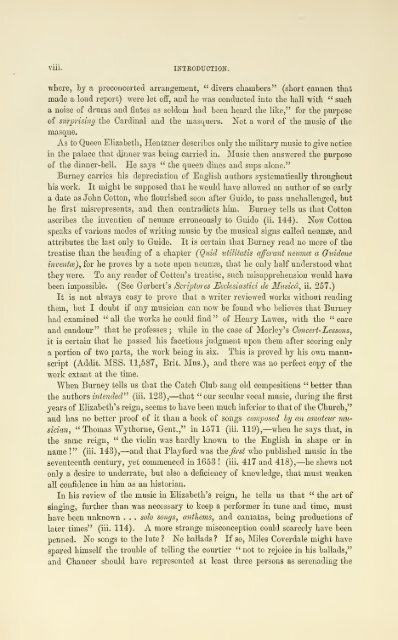Popular music of the olden time. A collection of ancient songs ...
Popular music of the olden time. A collection of ancient songs ...
Popular music of the olden time. A collection of ancient songs ...
Create successful ePaper yourself
Turn your PDF publications into a flip-book with our unique Google optimized e-Paper software.
vm.<br />
INTRODUCTION.<br />
where, by a preconcerted arrangement, " divers chambers" (short cannon that<br />
made a loud report) were let <strong>of</strong>f, and he was conducted into <strong>the</strong> hall with " such<br />
a noise <strong>of</strong> drums and flutes as seldom had been heard <strong>the</strong> like,"<br />
for <strong>the</strong> purpose<br />
oi surprising <strong>the</strong> Cardinal and <strong>the</strong> masquers. Not a word <strong>of</strong> <strong>the</strong> <strong>music</strong> <strong>of</strong> <strong>the</strong><br />
masque.<br />
As to Queen Elizabeth, Hentzner describes only <strong>the</strong> military <strong>music</strong> to give notice<br />
in <strong>the</strong> palace that dinner was being carried in.<br />
Music <strong>the</strong>n answered <strong>the</strong> purpose<br />
<strong>of</strong> <strong>the</strong> dinner-bell. He says " <strong>the</strong> queen dines and sups alone."<br />
Bui-ney carries his depreciation <strong>of</strong> English authors systematically throughout<br />
his work.<br />
It might be supposed that he would have allowed an author <strong>of</strong> so early<br />
a date as John Cotton, who flourished soon after Guido, to pass unchallenged, but<br />
he first misrepresents, and <strong>the</strong>n contradicts him. Burney tells us that Cotton<br />
ascribes <strong>the</strong> invention <strong>of</strong> neumse erroneously to Guido (ii. 144). Now Cotton<br />
speaks <strong>of</strong> various modes <strong>of</strong> writing <strong>music</strong> by <strong>the</strong> <strong>music</strong>al signs called neumse, and<br />
attributes <strong>the</strong> last only to Guido.<br />
It is certain that Burney read no more <strong>of</strong> <strong>the</strong><br />
treatise than <strong>the</strong> heading <strong>of</strong> a chapter (Quid utilitatis afferant netmim a Guidone<br />
inventm), for he proves by a note upon neumas, that he only half understood what<br />
<strong>the</strong>y were. To any reader <strong>of</strong> Cotton's treatise, such misapprehension would have<br />
been impossible. (See Gerbert's Scriptores Ucclesiastici de Mnsicd, ii. 257.)<br />
It is not always easy to prove that a writer reviewed works without reading<br />
<strong>the</strong>m, but I doubt if any <strong>music</strong>ian can now be found who believes that Burney<br />
had examined " all <strong>the</strong> works he could find " <strong>of</strong> Henry Lawes, with <strong>the</strong> " care<br />
and candour" that he pr<strong>of</strong>esses ;<br />
while in <strong>the</strong> case <strong>of</strong> Morley's Concert-Lessons,<br />
it is certain that he passed his facetious judgment upon <strong>the</strong>m after scoring only<br />
a portion <strong>of</strong> two parts, <strong>the</strong> work being in six. This is proved by his own manuscript<br />
(Addit. MSS. 11,687, Brit. Mus.), and <strong>the</strong>re was no perfect copy <strong>of</strong> <strong>the</strong><br />
work extant at <strong>the</strong> <strong>time</strong>.<br />
When Burney tells us that <strong>the</strong> Catch Club sang old compositions " better than<br />
<strong>the</strong> authors intended" (iii.<br />
123),—that " our secular vocal <strong>music</strong>, dm-ing <strong>the</strong> first<br />
years <strong>of</strong> Elizabeth's reign, seems to have been much inferior to that <strong>of</strong> <strong>the</strong> Church,"<br />
and has no better pro<strong>of</strong> <strong>of</strong> it than a book <strong>of</strong> <strong>songs</strong> composed by an amateur <strong>music</strong>ian,<br />
" Thomas Wythorne, Gent.," in 1571 (iii. 119),—when he says that, in<br />
<strong>the</strong> same reign, " <strong>the</strong> violin was hardly known to <strong>the</strong> English in shape or in<br />
name !" (iii. 143),—and that Playford was <strong>the</strong> Jirst who published <strong>music</strong> in <strong>the</strong><br />
seventeenth centm-y, yet commenced in 1653 ! (iii. 417 and 418),—he shews not<br />
only a desire to underrate, but also a deficiency <strong>of</strong> knowledge, that must weaken<br />
all confidence in him as an historian.<br />
In his review <strong>of</strong> <strong>the</strong> <strong>music</strong> in Elizabeth's reign, he tells us that " <strong>the</strong> art <strong>of</strong><br />
singing, fur<strong>the</strong>r than was necessary to keep a performer in tune and <strong>time</strong>, must<br />
have been unknown . . . solo <strong>songs</strong>, an<strong>the</strong>ms, and cantatas, being productions <strong>of</strong><br />
later <strong>time</strong>s" (iii. 114). A more strange misconception could scarcely have been<br />
penned. No <strong>songs</strong> to <strong>the</strong> lute No ballads If so. Miles Coverdale might have<br />
spared himself <strong>the</strong> trouble <strong>of</strong> telling <strong>the</strong> courtier<br />
" not to rejoice in his ballads,"<br />
and Chaucer should have represented at least three persons as serenading <strong>the</strong>

















